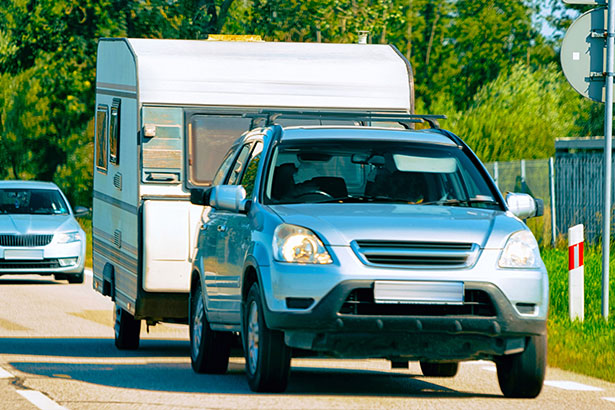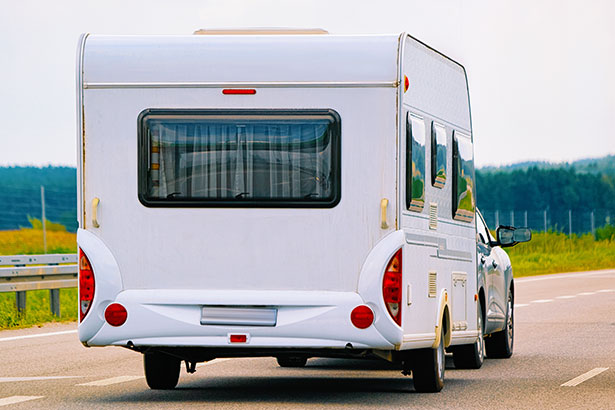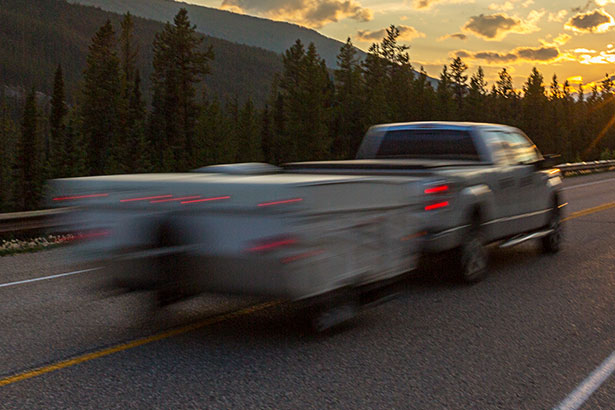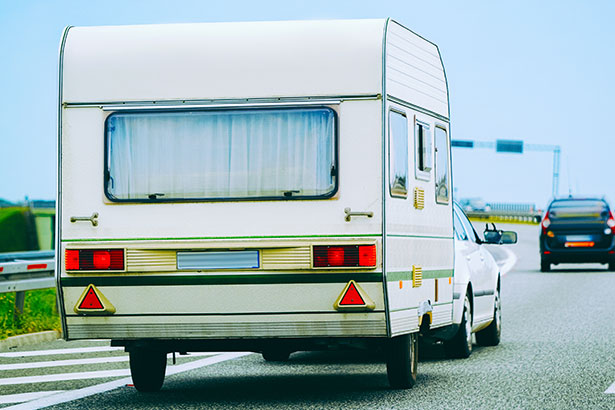
If you are new to towing or could use a refresher, utilise this guide on car towing tips for some helpful information. Inside, we go explain how to confirm your vehicle’s towing specifications such as load capacity and towbar rating while ensuring the caravan or trailer falls within legal limits.
As you will see later, knowing all of these figures will help to avoid any potential disasters on the road. So, buckle up and follow these car towing tips to ensure the safety of your vehicle, its occupants and other road users.
Car Towing Tips: Overview
Start by checking your vehicle handbook for the load capacity, and make sure you do not exceed it when towing a caravan or trailer. This number represents the maximum weight you can safely tow and includes both the caravan or trailer and any cargo you have loaded onto it.
Next, check the towbar rating to make sure that it is capable of carrying the weight of your caravan or trailer. This number must match or exceed the combined weight of your vehicle and caravan or trailer.
Finally, make sure that your vehicle, trailer and cargo are all within the legal limits. This includes making sure the width and length of your caravan/trailer is not too great, as well as any other restrictions set out by local road laws.
These car towing tips should help ensure your safety on the roads while pulling a caravan or trailer. Always pay careful attention to your vehicle’s load capacity, towbar rating and any legal limits that might be in place.

Understanding Car Towing Specifications
To help you understand towing specifications as part of the towing equation, we’ve defined some of the most important terminologies below.
- ‘Tare’ refers to the weight of your vehicle when it’s empty so no passengers, fuel, or luggage but it does include all standard fittings
- ‘Payload’ is the maximum combined weight of passengers, fuel and luggage that the vehicle, caravan or trailer can carry
- ‘Gross Vehicle Mass (GVM)’ refers to the maximum, fully loaded mass of the vehicle – including both the tare and payload
- ‘Gross Combination Mass (GCM)’ refers to the total weight of a fully loaded tow car plus the maximum towing capacity, as specified by the manufacturer
- The maximum force a towbar can endure without breaking is called its ‘static load’
- The maximum capacity that a towbar can support is specified by the manufacturer. This mass includes the trailer or caravan being towed and is referred to as ‘Towbar Maximum Drawing Capacity’
- ‘Noseweight’ is the mass of a caravan or trailer measured at the tow hitch which legally has to be between 25 kg and 100 kg in South Africa
- The ‘Maximum Towing Capacity’ is specified in kilograms by the vehicle’s manufacturer and refers to the maximum weight their vehicles can safely handle
What Is A Braked Trailer or Braked Caravan?
Some trailers and caravans are equipped with an ‘overrun’ brake system which is classified as ‘braked.’ In South Africa, the legislation mandates that any caravan or trailer with a GVM 750 kg or higher must have brakes. Here is a simple breakdown of how it works:
- The caravan’s brakes are activated when the tow vehicle’s brakes are applied
- A shock absorber located behind the coupling of the caravan compresses with force due to the weight of the caravan and activates the trailer brakes
- Both vehicles will brake at approximately the same time or just after one another

What Is Unbraked Towing Capacity?
In contrast to braked trailers or caravans, unbraked ones do not have brakes of their own and rely on the tow vehicle’s brakes. Unbraked trailers and caravans can weigh up to 750 kg gross combined weight and they typically don’t require a special licence as with higher GVM braked ones. When towing an unbraked trailer or caravan, it is important to keep the nose weight within 25-30% of the total GCM weight to ensure your tow vehicle has sufficient braking power and stability.
Different Car Towing Capacities
The towing capacity of a car will differ depending on its make and model. Generally, the weight of the vehicle is a major factor in determining how much it can tow. Larger vehicles like SUVs and bakkies tend to have higher towing capacities than smaller cars.
The size of the trailer being towed also affects how much a vehicle can pull. Larger trailers or campers tend to require more power from the engine and suspension system in order to be safely hauled. The type of hitch used is also important. Weight distribution hitches that can transfer some of the trailer’s weight to the vehicle are ideal for heavier loads.
Car Towing Capacity Of 3,000 kg or More
- Toyota Land Cruiser
- Toyota Hilux and Fortuner
- Ford Ranger
- Nissan Navara
- Nissan Patrol
- Land Rover Discovery
- Audi Q7
Cars With Towing Capacity Of 2,000 to 3,000 kg
- VW Amarok
- Nissan Navara
- Hyundai Terracan
- Volvo XC60
- Land Rover Discovery Sport
- Kia Sorento
- Nissan X-Trail
Cars With Towing Capacity Of 750kg to 2,000 kg
- VW Golf 1.4
- Opel Corsa 1.4
- Honda Jazz
- VW Polo
- Renault Clio
- Mercedes Benz A-Class
- Audi A3
- Open Astra
Cars With Towing Capacity Of 750kg or Less
- Toyota Tazz
- Toyota Yaris
- Ford Fiesta
- Suzuki Jimny
- Ford Bantam
- Opel Corsa Utility
What Does The Law Say About Car Towing?
It is important to adhere to all the laws regarding car towing, as these are in place for your safety and that of other road users. In South Africa, the National Road Traffic Act regulates all aspects of car towing and it sets minimum standards for certain types of vehicles when used on public roads. It states the following:
- An EB licence is required to tow any vehicle with a GVM over 750 kg.
- All towables with a GVM (Gross Vehicle Mass) greater than 750 kg need to be equipped with overrun brakes.
- A tow car’s tare (weight when empty) must be equal to or greater than double the trailer’s GVM (gross vehicle mass), in order to tow an unbraked trailer with a GVM of up to 750 kg.
- The tare weight of a vehicle towing a braked trailer or caravan must be equal to or greater than the GVM of the trailer.
- If your tow car is a bakkie which classifies as a goods vehicle, its GCM must not be exceeded, even if you have extra service brakes fitted to the trailer or caravan. Please note that this regulation does not apply to passenger cars or SUVs as they are not classified as goods vehicles.
- Towbars and drop plates fitted by aftermarket accessory suppliers must be SABS-approved

How To Get An EB Licence For Car Towing
If you want to upgrade your B licence to an EB licence, there are a few steps you have to follow. You’ll need to retake the learner’s licence exam and then make an appointment for the driving test at a local testing station that offers this type of assessment. The evaluation is done using a tow vehicle and trailer and includes a pre-drive safety inspection, yard section, as well as an on-road evaluation. During the yard section, you will have to do the following to pass:
- Execute a turn
- Reverse in a straight line
- Alley dock (Reverse park)
- Parallel park (with the trailer unhitched)
- Start on an incline without rolling back
Car Towing Pitfalls Drivers Must Be Aware Of
No matter how experienced a driver may be, the process of towing a caravan or trailer can be intimidating. There are several risks and mistakes that drivers need to be aware of before hooking up their caravan.
- Depending on the size of the caravan and the tow vehicle, drivers may need to reduce their regular highway speed.
- Towing a trailer with a vehicle that is not designed to tow can create issues if the weight of the load is exceeded. The excess strain on the drivetrain can cause failure and damage.
- If the vehicle’s brakes are not up to the task of stopping such a heavy load, it could lead to dangerous or catastrophic situations.
- Faulty wiring can cause shorts, sparks and even fires if left unchecked. Make sure any tow vehicle has the correct harness for connecting the trailer’s lights to its electrical system.
If the caravan has a tow bar attached, it needs to be inspected on a regular basis to ensure that it is properly maintained. A worn-out tow bar can cause the caravan to detach from the vehicle, which is not only dangerous but also illegal.
How To Tow Another Car
Towing another car can be a tricky process, and it is important to ensure that you follow all safety guidelines to ensure the safety of both drivers. Below are the steps for safely towing another vehicle:
Tips for the tow car
- Use a good quality tow rope or tow bar. By law, the tow rope must be 3.5 metres or shorter
- Drive slowly and carefully but pay special attention when pulling away. If you don’t take up the slack in the rope beforehand, you could end up jerking the other car into yours
- Reduce driving speed to 30km/h which a required by law and remember to brake gently
- Always check on the car you are towing by frequently using your mirrors
- Constantly check traffic conditions to avoid needing to brake hard
Tips for the person being towed
- Turn on your ignition before you get towed to ensure that the steering won’t lock, and the power steering and brakes will still work if they are still functional
- Put the car in Neutral before being towed
- Pay attention to traffic and steer in tune with the tow vehicle
- Brake gently when needed to avoid letting too much slack into the tow rope
Before your car is towed, be sure to check the manual. There may be special procedures you need to follow so you don’t damage your car. Additionally, some automatic vehicles can’t be towed with their drive wheels on the ground and may require the services of a flatbed truck.
Final Thoughts On Car Towing Safety
It is essential that all motorists understand the risks involved in towing a caravan, trailer or another car. before attempting a tow with their vehicle. It is also important to ensure that the necessary safety equipment is in place, that the towed and towing vehicles are properly matched, and that driving conditions are suitable.
By following these car towing tips and being aware of the risks, drivers can ensure they have a safe and stress-free journey. For more information on used cars for sale and car towing specifications, get in touch with your nearest Group1 branch.

